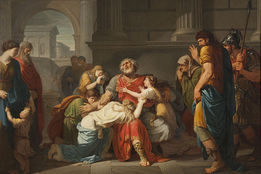tragedy
noun
trag·e·dy
ˈtra-jə-dē 

plural tragedies
1
a
: a disastrous event : calamity
b
2
a
: a serious drama typically describing a conflict between the protagonist and a superior force (such as destiny) and having a sorrowful or disastrous conclusion that elicits pity or terror
b
: the literary genre of tragic dramas
c
: a medieval narrative poem or tale typically describing the downfall of a great man
3
: tragic quality or element
Love words? Need even more definitions?
Merriam-Webster unabridged













Share